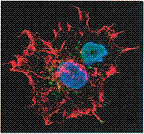Biochemistry, Department of

Gautam Sarath Publications
Document Type
Article
Date of this Version
1998
Abstract
Soybean root nodules possess a developmentally regulated acid phosphatase (ACP) that exhibits the highest specificity for purine 5’-nucleoside monophosphates. The enzyme is a glycosylated dimer of 28- and 31-kDa subunits, which appear to be products of the same gene but differ in posttranslational modifications. In order to perform directed mutagenesis and more extensive biochemical characterization, a means of producing recombinant ACP was needed. Several attempts were made to express ACP in Escherichia coli, but all conditions employed resulted in protein that was found entirely in inclusion bodies, and resolubilization experiments were unsuccessful. Therefore, the methyltrophic yeast Pichia pastoris was chosen as a eukaryotic expression host. The coding sequence of ACP was cloned into the pPIC9 vector to create a fusion with the yeast α mating factor secretion signal. The ACP:pPIC9 construct was integrated into P. pastoris strain GS115. Expression of ACP was under the control of an alcohol oxidase methanol-inducible promoter. Methanol induction resulted in secretion of ACP to a level of 10 mg/L. The recombinant ACP was purified 550-fold to homogeneity by phenyl-Sepharose, hydroxyapatite, and MonoS chromatography. The purified enzyme had Km values of 0.08 and 0.12 for 5’-AMP and 5’-GMP. These values were similar to those obtained for the native ACP heterodimer purified from soybean (0.08 and 0.15 mM for 5’-AMP and 5’-GMP). The specific activity of the recombinant enzyme for all substrates tested was 1.6- to 1.8-fold higher than the values for the purified soybean heterodimer.


Comments
Published in Protein Expression and Purification 14 (1998), pp. 125-130. (Article No. PT980935). Copyright © 1998 by Academic Press, division of Elsevier. Used by permission.